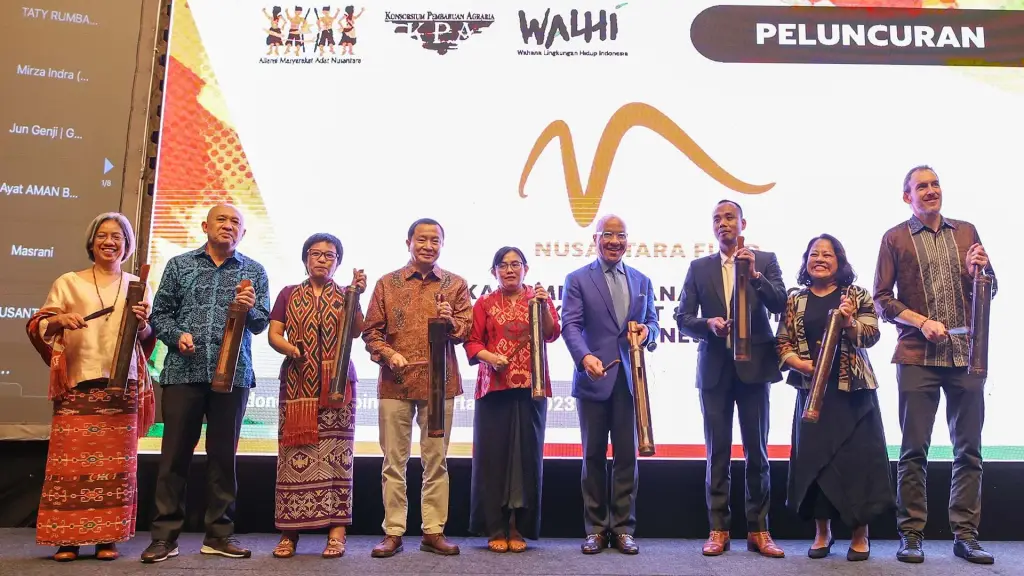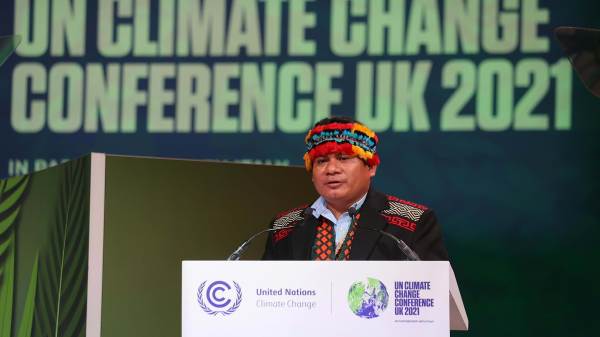
Today, we share our second annual update on our COP26 pledge to support the tenure rights and forest guardianship of Indigenous Peoples and local communities (IPs & LCs).
From June 30, 2022 to July 31, 2023, we approved $19 million in funding aligned with the goals of that pledge, in the form of new grants to the organizations listed below. In total, over the first half of the 5-year pledge, we approved $87 million in funding against our $100 million commitment.
Our grants include direct support for the long-term resilience of organizations of and movements led by Indigenous people and local communities (IPs and LCs) around the world and for related efforts to strengthen tenure rights and governance. Our partners’ work reinforces our belief that there is no viable solution to the climate crisis without advancing the rights of IPs and LCs.
While we are pleased with this progress, we also know that there is more work to be done. The proportion of our pledge-aligned funding going directly to IP and LC organizations and networks over the past year was 24%, a modest improvement over the 17% we reported last year. This year, we also tracked the percentage of our funding that ultimately reaches IPs and LCs in ways they can influence and control, recognizing that many of our direct partners regrant funding to IP and LC organizations and networks. We estimate that at least half of our pledge-aligned funding ultimately reaches IPs and LCs. We hope these numbers will continue to increase.
We continue to encourage all funders to increase their support for Indigenous Peoples and local communities. Last year, we pledged to accelerate the transparent, accountable, and effective implementation of the IP and LC pledge by taking additional steps. We have made progress in these areas:
| 2022 Commitment | Action |
| Posting annual progress updates on our website, documenting the status of our pledge commitment, including a list of pledge-aligned grants. | We will continue to post annual updates through 2025. |
| Joining other donors to support (i) an assessment of existing funding pathways for reaching IPs and LCs and (ii) a process to engage with Indigenous Peoples to assess principles, standards, and mechanisms for supporting tenure rights and forest guardianship, and documenting their aspirations for the pledge. | Charapa Consult published the report “Direct Funding to Rights: Principles, Standards, and Modalities for Supporting Indigenous Peoples’ Tenure Rights and Forest Guardianship”. We contributed funding to this assessment and the participatory process behind it. On behalf of the Forest Tenure Funders Group (FTFG), we commissioned Indufor to produce “Assessing Pathways for Channeling Support to Indigenous Peoples’ and Local Communities’ Tenure and Forest Guardianship in the Global South” |
| Creating dedicated internal discussion spaces within the Ford Foundation on land, territory, and autonomy and locally controlled funds, allowing us to share lessons among program team members across geographies, learn together with our partners, and be more coherent and effective in our grantmaking. | Dala Institute is finalizing an independent evaluation of Ford’s Natural Resources and Climate Change program, which includes an assessment of these topics. We will share an executive summary of the evaluation. The NRCC team continues to learn about these topics and will strengthen our work in these areas through our upcoming strategy refresh. We are also building a space for learning and exchange across IP- and LC- managed funds, like the Nusantara Fund; we believe these funds play an important role in increasing IP and LC influence and control over funding allocation. |
| Partnering with the Climate and Land Use Alliance, the Climate Leadership Initiative, and Forests, People, Climate to encourage new climate donors to include a focus on land and resource rights recognition and forest guardianship in their portfolios. | We helped support a team of consultants who discussed a draft of the Forests, People, Climate (FPC) strategy on IPs and LC rights and territorial governance. The strategy sessions engaged more than 150 representatives of IP and LC organizations from across tropical forest countries. FPC will post a summary of this strategy on its website. |
| Continuing discussions with IP and LC partners about how we and other funders can be more responsive to their needs and aspirations. | We continue to receive feedback—from individual discussions, grantee reports, the Center for Effective Philanthropy surveys, published analyses on the topic, and other channels. |
Grants (or portions thereof*) aligned with pledge criteria and approved during the period June 30, 2022 and July 31, 2023:
A Rocha Ghana
ActionAid USA
Agir Ensemble pour les Droits Humains (AEDH)
Amazônia Real
American University Center for Human Rights and Humanitarian Law
Articulation of Indigenous Peoples of the Northeast, Minas Gerais and Espírito Santo (APOINME)
Ashoka Indonesia
Asia Indigenous Peoples Pact (AIPP)
Asociación de Cabildos Indígenas del Norte del Cauca (ACIN) / Consejo Regional Indígena del Cauca (CRIC)
Bank Information Center
Baudó Agencia Pública
Burness
Canopée
Centre for Environmental Rights
Charapa Consult
Comitê Chico Mendes
Civic Council of Popular and Indigenous Organizations of Honduras (COPINH)
Comité Campesino del Altiplano (CCDA)
Community Forestry Association of Guatemala Utz Che’
Coordination of the Indigenous Organizations of the Brazilian Amazon (COIAB)
Doc Society
Energy Transition Fund
Environmental Action Germany (DUH)
Environmental Investigation Agency (EIA US)
Fondo Tierra Viva
Forest Peoples Programme
Global Alliance of Territorial Communities (GATC)
Global Greengrants Fund
HuMa
Human Impacts Institute
If Not Us Then Who?
Indigenous Council of Roraima (CIR)
Indonesia Innovation Technology Foundation (INOTEK)
Indonesian International Education Foundation (IIEF)
Indonesian Philanthropy Association (Filantropi Indonesia)
Indonesian Tropical Institute (LATIN)
Institute for Development and Peace Studies (INDEPAZ)
Institute for Essential Services Reform
Institute for Management and Certification of Agriculture and Forestry (IMAFLORA)
Institute of Global Law (IDG)
Institute of Research and Indigenous Formation (IEPÉ)
Instituto Socioambiental (ISA)
Interamerican Association for Environmental Defense (AIDA)
International Work Group for Indigenous Affairs
MadreSelva Collective
Manka Indonesia
MiningWatch Canada
Mongabay
Movement of People Affected by Dams (MAB)
Movilizatorio
National Articulation of Indigenous Peoples (APIB)
Nigerian Conservation Foundation
Nupef Institute
Observatory for the Human Rights of Isolated and Recently Contacted Indigenous Peoples (OPI)
Office of the U.N. High Commissioner for Human Rights
Oil Change International
PATTIRO
Penabulu Foundation
Perkumpulan Pilar Nusantara (PINUS)
Popular Indigenous Regional Council of Xpujil (CRIPX)
Publish What You Pay Indonesia
PUPUK Indonesia
Regional Program of Research on Development and the Environment (PRISMA Foundation)
Rekam Nusantara Foundation
Renewable Energy and International Law Project
Reporter Brasil
Reporters Without Borders (RSF)
Resource Conservation Initiative
Royal Institute of International Affairs (Chatham House)
Rumah Energi Foundation
Samdhana Institute
São Paulo Pro-Indian Commission (CPI-SP)
Solidarity Action Fund (FASOL)
Stand.earth
Talanoa Institute
Tifa Foundation
UN Women – Brazil
University of Indonesia Center for Climate and Sustainability Finance
University of Indonesia Institute for Economic and Social Research
University of Indonesia Research Center for Climate Change
University of Queensland
WoMin
World Resources Institute
Yale Environment 360
YAPPIKA – ActionAid Indonesia
Zimbabwe Environmental Law Association
*In cases where funding to an organization also supports activities beyond those outlined in the pledge criteria, we have only counted a portion of the grant amount toward the progress reported here.

